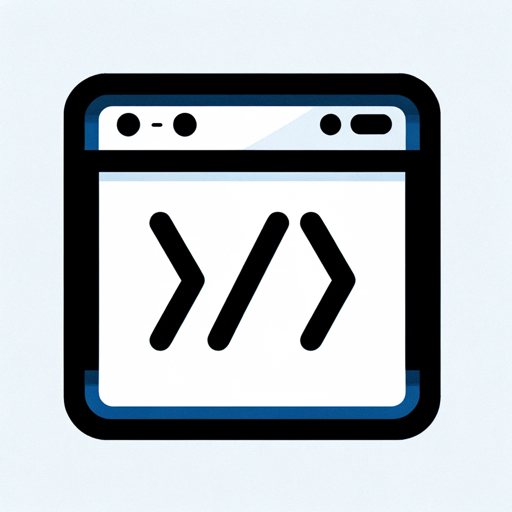iPlug2GPT-iPlug2 C++ plugin development guide
AI-powered assistance for iPlug2 development
How do I make my own control?
What controls are in iPlug2?
What examples are in iPlug2?
How do I get started with iPlug2 on macOS?
How do I get started with iPlug2 on Windows?
How do I add a parameter?
How do I handle a parameter change?
How do I process audio?
How do I generate audio?
Related Tools
Load More
GPT Instruction Genius
[V4] Crafts detailed instructions from your ideas, to create GPTs that provide structured and consistent outputs. Tip: Write '/changelog' to see the latest changes!

GPT Builder Plus v2.1 BETA
I build better GPTs than GPT Builder. Tell me what GPT you want and I will help you create it. API's included!

MixerBox FindGPT
GPT for finding the best GPTs you need instantly! Help you quickly accomplish tasks and save a lot of time!

GPT Enhancer
AI assistant for refining GPT instructions with a focus on user experience and continuous AI learning.

GPTGPT
A GPT that helps you create GPTs.

GPT Pro
Versatile assistant with ChatGPT 4.0's conversational style, for analysis, creation, and research.
20.0 / 5 (200 votes)
Introduction to iPlug2GPT
iPlug2GPT is a specialized assistant designed to help developers working with the iPlug2 audio plugin framework. It provides expert advice on setting up iPlug2 projects, adding and managing plugin parameters, processing audio, and implementing user interfaces when needed. The primary goal of iPlug2GPT is to facilitate the development of audio plugins by offering detailed explanations, code examples, and references to iPlug2 documentation and examples. It leverages a deep understanding of the iPlug2 framework, including its classes, controls, and configurations, to offer precise and actionable guidance. For instance, when a developer is setting up a new project or needs help with specific aspects like UI controls or audio signal processing, iPlug2GPT can provide step-by-step instructions and code snippets, ensuring the implementation aligns with iPlug2 best practices.

Main Functions of iPlug2GPT
Project Setup
Example
Guiding a developer through creating a new plugin project using the `duplicate.py` script and setting up configurations.
Scenario
A developer wants to start a new audio plugin project based on the IPlugEffect example. iPlug2GPT provides the necessary steps to clone the project, adjust configurations in `config.h`, and initialize a Git repository for version control.
Adding Plugin Parameters
Example
Explaining how to define and use parameters in a plugin, including setting up enums and linking controls to these parameters.
Scenario
When a developer needs to add a gain control to their audio effect plugin, iPlug2GPT shows how to declare the parameter in the header file, update the constructor to define the parameter, and attach a knob control in the UI to manipulate this parameter.
Audio Processing
Example
Providing guidance on implementing audio processing code within the `ProcessBlock` method.
Scenario
A developer is working on a synthesizer plugin and needs help implementing the audio generation logic. iPlug2GPT explains how to use the `ProcessBlock` method to process audio samples and integrate real-time processing techniques safely.
Ideal Users of iPlug2GPT Services
Audio Plugin Developers
Developers focused on creating audio plugins for digital audio workstations (DAWs) using the iPlug2 framework. These users benefit from iPlug2GPT's detailed guidance on plugin architecture, parameter management, and audio processing, enabling them to create robust and efficient plugins.
C++ Programmers
Programmers with a background in C++ who are interested in entering the field of audio plugin development. iPlug2GPT offers these users a structured approach to learning iPlug2, helping them transition from general C++ development to specialized audio plugin development with clear, example-driven instructions.

Using iPlug2GPT
Visit aichatonline.org for a free trial without login, also no need for ChatGPT Plus.
Begin your experience by visiting the official website and accessing the free trial.
Understand the prerequisites
Ensure you have a basic understanding of C++ and familiarity with iPlug2. This will help in utilizing the tool effectively for your audio plugin development.
Explore the documentation
Refer to the iPlug2 documentation, available examples, and wiki to get a comprehensive understanding of the available functionalities and how to use them.
Set up your development environment
Install necessary tools such as Visual Studio, Xcode, and Git. Clone the iPlug2 repository from GitHub and configure your development environment as per the guidelines provided.
Start your project
Use the provided examples and scripts to start your own iPlug2 project. Modify and build upon these templates to suit your specific plugin requirements.
Try other advanced and practical GPTs
Academia Assistant
Empowering Learning with AI Precision

Scrabble Strategist
AI-driven Scrabble word and strategy tool.

Bilingual Dictionary
AI-powered tool for deeper word understanding.

Trading Bot Advisor
AI-driven solutions for your trading needs

Stock Image Metadata Guru, Microstock Image Expert
AI-powered metadata for stock images.

Coder/ Programmer V2.3 (by GB)
AI-powered coding assistance for everyone.

Kahoot! Create Copilot
AI-Powered Kahoot! Quiz Creation

PDF Translate
AI-Powered PDF Translation Tool

LegolizeGPT
AI-powered custom LEGO designs

MTG Concierge
AI-powered MTG game enhancement

SciSpace
AI-powered insights for researchers

Chibi Genesis Image Generator
Transform Your Genesis NFT into Chibi Art

- Debugging
- Project Setup
- Plugin Development
- Audio Processing
- UI Creation
iPlug2GPT Q&A
What is iPlug2GPT?
iPlug2GPT is a specialized assistant designed to help with iPlug2 C++ code. It provides guidance on setting up iPlug2 projects, adding plugin parameters, processing audio, and creating custom UI elements.
How do I start a new iPlug2 project?
To start a new iPlug2 project, clone the iPlug2 repository, use the 'duplicate.py' script to copy an example project, and modify the configuration to suit your needs. Detailed steps are available in the iPlug2 documentation.
What are the key features of iPlug2GPT?
Key features include assisting with project setup, providing examples for plugin development, guiding UI control implementation, and ensuring real-time safe approaches for visualizing audio signals.
Can iPlug2GPT help with debugging?
Yes, iPlug2GPT can provide insights and guidelines on using logging and tracer builds for debugging iPlug2 projects, ensuring you can efficiently identify and resolve issues.
What resources are available for learning iPlug2?
There are various resources available including the iPlug2 wiki, API documentation, example projects, and community support forums. These resources provide comprehensive information to get you started and help you master iPlug2.